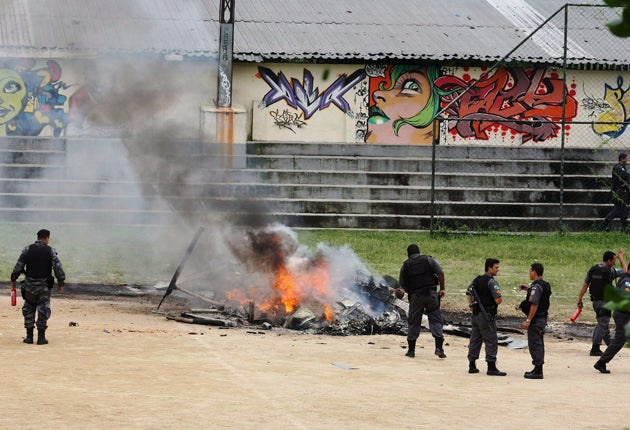Olympic fears as Rio drug gangs shoot down police helicopter
All-day battle in slum reaches new levels of violence as 12 die

Police chiefs in Rio de Janeiro yesterday mobilised an additional 4,500 officers in areas of the city that were plunged into violent chaos all day Saturday as rival drugs gangs battled for turf, renewing fears that the city may struggle to ensure security when it plays host to the 2016 Olympic Games.
Outbreaks of bloodshed are hardly uncommon in the hillside slums – or favelas – of Rio de Janeiro, already recognised as one of the most deadly cities in the world. Urban violence has been a feature of life there for decades. Last year saw over 6,000 murders in Rio, most related to drug-gang feuds.
But Saturday's spasm was unusually intense, sending dense plumes of black smoke into the sky and forcing government officials to issue words of reassurance about the games. It was only two weeks ago that the Brazilian city was chosen over Chicago, Madrid and Tokyo to stage the games after London. It was hailed as a breakthrough for South America, which has never hosted an Olympics.
Several hours of gunfire concentrated in the Morro dos Macacos (Monkey Hill) slum left 10 people dead on the ground. Additionally two policemen died when bullets ripped into their helicopter that was hovering over the battle, sending it plummeting into a football field. Yesterday, officials said two more gang leaders had been killed by police action overnight.
Jose Mariano Beltrame, the security chief for the state of Rio de Janeiro, confirmed the additional deployments, saying that the reinforcements were coming from outlying areas of the city. Their first goal, he said, was to lower tensions. The favelas mostly cling to the hills surrounding the business districts and famed beach areas of Rio and are home to some 2 million people – as well as the drug gangs.
The Justice Ministry in Sao Paolo meanwhile said it was ready to provide members of an élite army unit to guard against a resurgence of the violence, but the offer was not taken up by city authorities. The areas that were so chaotic on Saturday appeared mostly peaceful yesterday as the clean-up began.
It was the first time a police helicopter had been brought down during the drug wars. After it crashed in a fireball into the football field, four police officers escaped with burns but two perished. Officials said they had not determined whether the aircraft had been deliberately targeted or had been hit by stray bullets.
But the events of the weekend are an embarrassment for the government which has barely finished celebrating its success in winning the Olympic bid.
"We told the International Olympic Committee that this won't be an easy thing, and they know that," Rio's state governor, Sergio Cabral, said. "We can put 40,000 people on the streets – federal, state and municipal police – and pull off the event."
Rio will have some practice in 2014 when it is due to welcome the football World Cup. President Luiz Inacio Lula da Silva has meanwhile pointed out that the city successfully staged the Pan-American Games in 2007, in part by using 15,000 specially trained officers effectively to fence off the slums from the rest of the city.
Generally, the residents of downtown Rio and the tourists who join them are untouched by the violence going on in the slums. From time to time, however, it has spilled beyond the favelas, and has on occasion also caused the closure of the main road from the airport to the beaches.
Officials said the violence of Saturday erupted when gang members from the Red Command, based a different slum, invaded Morro dos Macacos, controlled by the Friends of Friends gang, in a bid to seize power. The area is roughly five miles from one of the zones of the city that have been designated for Olympic sports activities.
Subscribe to Independent Premium to bookmark this article
Want to bookmark your favourite articles and stories to read or reference later? Start your Independent Premium subscription today.

Join our commenting forum
Join thought-provoking conversations, follow other Independent readers and see their replies